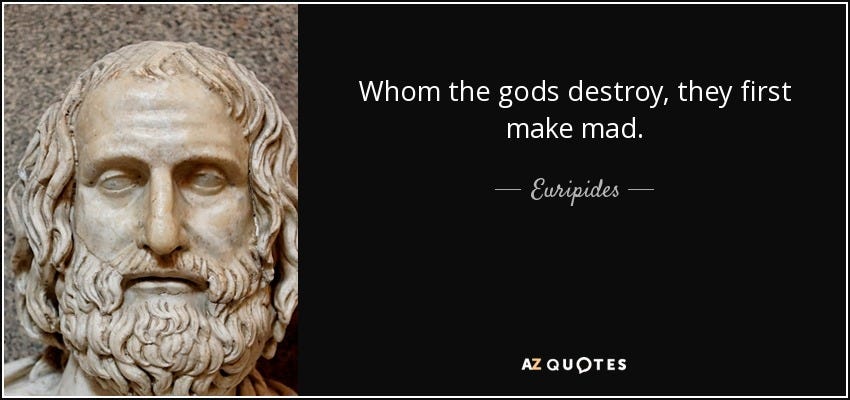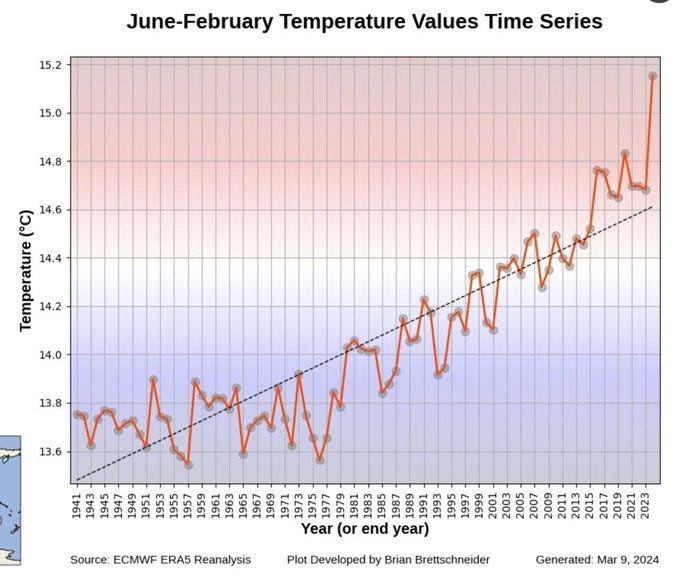Yves here. At its core, our denial of the dire-and-coming-ahead-of-schedule effects of climate change is very similar to our denial of death. With the exception of those who are religious and those who have had near-death experiences, most of us don’t want to think seriously about death or climate change. So as readers may guess, I’m not big on hope. Hope against reality often produces action/inadequacy, like the Green New Deal’s rainbows and unicorns.
Written by Thomas Neuburger. It was first published in the book God’s Spies
Much is taken, much remains; again
We don’t have that power now that in the old days
Earth and heaven shook, what we are, we are
— Alfred Lord TennysonAll your crying is useless
Go up to the house
Come down from the cross, we can use wood
Go up to the house
— Tom WaitsDoes death make life miserable?
– Submissive
I’ve been wanting to write for some time about how we might respond to the coming climate disaster, Jackpot, in William Gibson’s terms. Respond to what will be, in terms of world history, the world’s most important event since the birth of the brain and culture we call it.
I started that project in a few stages here and there. But I wanted to give these thoughts a proper page.
A Push to Give Hope
Let’s start with this, from scientist Kate Marvel:
As a climate scientist, I am often asked to speak about hope. Especially in the current political climate, audiences want to be told that everything will be okay in the end. And, unfortunately, I have a deep need to be liked and an innate tendency to be optimistic that leads to accepting more speaking invitations than are good for me. Climate change is bleak, planners say. Tell us an interesting story. Give us hope. The problem is, I don’t have one.
“Give hope” is the admonition that is always present in the climate. Consider this from Kaitlin Naughton, a scientist with the British Antarctic Survey, writing in The Conversation: “Conventional wisdom is that you have to give people hope: to say that there is a disaster behind one door, but we can avoid it if we just choose a different one.”
This is more than conventional wisdom. The strategic argument is: If you pressure people with insulting words, they will shut up and do nothing. We need people to take action. (Clear: Because we can still win, we maintain a life with great strength.)
And this becomes almost a moral discipline, a subject of moral assessment, and sometimes, of shame. “Don’t talk about the lost millions (dollars, lives). Talk about benefits – new jobs, green economy. Don’t be Debbie.”
It’s all well and good. But what if it seems to you, as it seems to many, that death has been cast? Are you lying? Do cheerleader work? Or admit the truth (as you and your audience see it), and offer, not hope, but something more true to the facts?
The facts are on the ground
The truth is, we are doing nothing about the weather. You noticed that, right?
And notice, I hope, the reason: that we – I mean both parties – are ruled (we must say) by money-crazed psychopaths who have put a lock on the entire electoral process, from the debate to reaching the polls, to make sure that only the person who will eat the money can win. (Yes, Trump was a funded candidate in 2016.)

The gods who were going to destroy him, first went crazy. There is more than enough hubris in the best of us lunatics to sink our lot. Even if the weather is staring us in the face, how soon will we fix it? This decade? This century?
But the weather is something staring us in the face, a tsunami that is almost invisible even to the blind.

What do we tell people as they start to wake up? What do we say when they find out that there is no going back?
We can tell them, although hope is a dream, courage is something they can do.
‘We Need Courage, Not Hope.’
Here’s what Kate Marvel, the aforementioned climate scientist, recently wrote. First, you state the problem (emphasis all mine):
I have lived a lucky, lovely, lovely life. This means that I have an unlimited, delusional faith in the goodness of each person. But I have nothing in the group. How else could the sum total of so many acts of kindness be a world that could not stop something so amazing? California is burning. Islands and coasts are destroyed by hurricanes. At night the stars are bathed in city lights and the world is illuminated by the flickering evil of reality television. We burn coal and oil and gas, ignoring the consequences. …
Now there is no climate that has not touched us, no wilderness is immune from our stress. The world we once knew will not return.
This is more honest public speaking than most people like him will do. (Privately, most know the truth. They panic.)
And the answer:
And here, the enormity of the problem offers the opposite comfort: we are in this together. The immediacy of change, its scale and inevitability, binds us into a single, broken heart trapped together under a blanket of warmth.
We need courage, not hope. After all, grief is the cost of living. We are all destined to live lives shot through with sadness, and we are no less important for it. Courage is the decision to do good without the guarantee of a happy ending.
There is Joy in Working Together
We are in this together. The Romans crossed the border. Our elders may have escaped death (thinking of you, Charles G. Koch), but those in their thirties will see the children of people like them living lives with a different destiny than ours.
Terrible things happen; they happen all the time. And just as good people pass away, so does civilization. There are miracles in the world, but we will not call them.
What are we it can be to give the best of ourselves – our wisdom, our love, the example of courageous response – to those who share our burden and our sorrow.
“What we are, we are,” says Tennyson’s Ulysses. And that is nothing, as long as we still have life. We can do this together, intentionally engaging in work. There is joy in those actions, which we will carry within and over the beast at the gates.
I’d rather have that, the ability to act boldly, than dwell on unimportant hope. First, it is better for others who may need firewood.

Source link